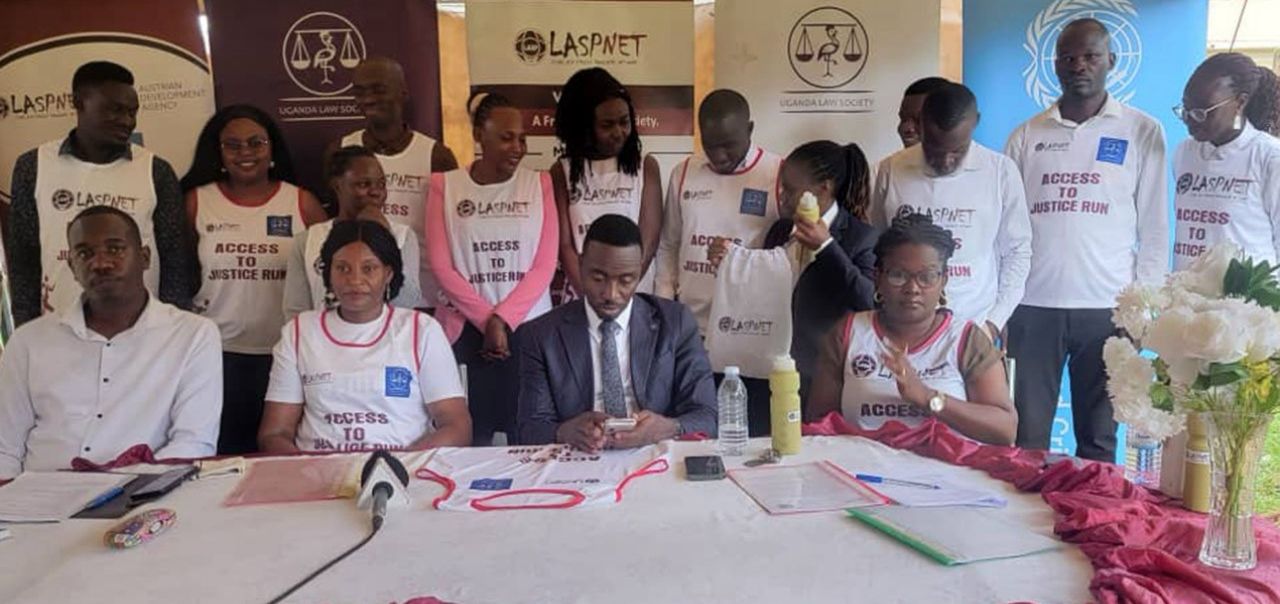Legal aid advocates have intensified pressure on government to expedite the long-delayed National Legal Aid Bill, cautioning that millions of Ugandans—especially the poor and marginalized—continue to face injustice simply because they cannot afford legal representation.
The renewed appeal was issued during a high-level stakeholder engagement in Kampala, bringing together the Legal Aid Service Providers Network (LASPNET), the Uganda Law Society (ULS), civil society actors, and development partners.
Participants unanimously urged Parliament to urgently pass the Bill, which has stalled for years despite widespread support.
The Executive Director of LASPNET, Sylvia Namubiru, emphasized that Uganda’s justice system continues to favour those with financial capacity, leaving nearly 80 percent of citizens without access to meaningful legal support.
“Justice is not a privilege for the rich; it is a constitutional right. Without a government-funded legal aid system, millions of Ugandans remain excluded. We need this Bill passed now,” Namubiru said.
She criticized reliance on donor-funded initiatives, describing the current model as unstable and unsustainable.
“A strong state-funded legal aid scheme is the only guarantee that justice will reach the poorest Ugandans. People should not rely on foreign donations to solve local justice problems,” she added. Namubiru further expressed disappointment over the technical objections that have repeatedly delayed the Bill.
“There was broad support from civil society, faith-based institutions, and legal aid providers, and a technicality should not be the reason people remain unprotected,” she said.
The Vice President of Uganda Law Society, Anthony Asiimwe, echoed these concerns, warning that the country’s legal needs far exceed the capacity of volunteer lawyers and low-cost practitioners.
“Only 20 percent of Ugandans can afford legal fees. That should worry the nation. A constitutional right is meaningless if people cannot afford representation,” Asiimwe said.
He urged legal professionals nationwide to rally behind LASPNET’s advocacy efforts, expand pro-bono services, and support vulnerable citizens while Parliament resolves the Bill’s impasse.
According to Asiimwe, passing the National Legal Aid Bill would dramatically increase access to justice by regulating and accrediting legal aid providers, strengthening pro-bono work, reducing case backlogs through early representation, and enhancing legal protection for women, children, and rural communities.
The Bill, initially tabled as a Private Member’s Bill, had already secured a Certificate of Financial Implication, indicating readiness for debate and passage.
However, its progress was halted by the Legal and Parliamentary Affairs Committee following advice from the Attorney General that certain clauses would impose financial obligations on government—contravening Article 93 of the Constitution, which restricts Private Members from introducing expenditure-related legislation.
Research by HiiL (2016, 2020, 2024) shows that nearly 80 percent of Ugandans encounter legal problems—most frequently involving land disputes, domestic violence, family conflicts, and criminal matters—highlighting the critical need for an institutionalized legal aid framework.
During the same event, LASPNET and ULS officially launched the Access to Justice (A2J) Run 2025, slated for November 29, 2025, at the Law Development Centre in Makerere.
The charity run—held under 3km, 5km, and 10km categories—will raise funds for the establishment of the proposed Legal Aid House.
The day will also feature a Legal Aid Open Day along with sports and recreational activities for lawyers. Over 5,000 participants are expected, with Buganda Kingdom Minister of Lands and Properties, David F.K. Mango, serving as Chief Runner.
LASPNET and ULS reiterated their commitment to championing equitable access to justice and urged government to prioritize passage of the National Legal Aid Bill to ensure that no Ugandan is denied justice due to financial constraints.


